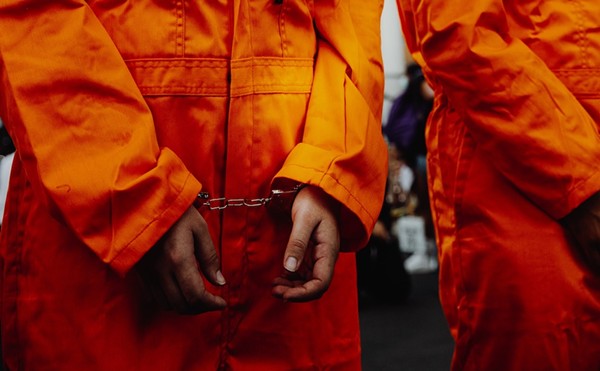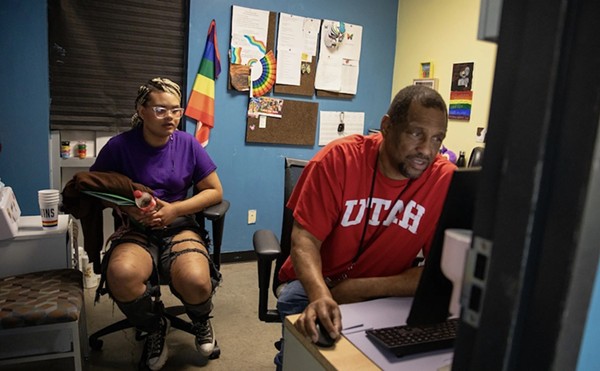Trying once more to tackle his self-proclaimed Texas immigration emergency, Governor Rick Perry added the second permutation of anti-sanctuary cities legislation to the special session roster, sparking a repeat of the tense and ugly immigration debate that mired the regular session.
The measure, which would keep police departments from banning immigration checks and expand the footprint of the controversial federal fingerprint-sharing program dubbed Secure Communities, “sends a clear message that Texas will not turn a blind eye to those breaking our laws,” Perry announced earlier this month.
And even before its predestined passage through the Lege, SB9 has proven ugly and divisive. Before clearing the state Senate last week, Rebecca Forest, who heads Immigration Reform Coalition of Texas, a right-wing immigration- reform group, told a crowd supporting the bill, “We have 37, no 36 Hispanics in the Legislature. So, that’s part of our problem, and we need to change those numbers, in fact.”
The cost of a state immigration policy is becoming even clearer as a host of law enforcement officials statewide continue to decry the legislation as dangerous, fearing it’s likely to deter witnesses and crime victims from coming forward amid the threat of deportation for themselves or their family members.
In a letter to lawmakers last week, a group of Texas sheriffs and police chiefs, including SAPD Chief Bill McManus and Bexar County Sheriff Amadeo Ortiz, wrote: “Alienating any sector of our community from law enforcement is not good for Texas and is not good for our society.” Democratic senators had hoped to ease those concerns with two amendments to SB9 that would have excluded witnesses, children under 17, and crime victims from immigration inquiries — both amendments were shot down.
Said Senator John Whitmire, D-Houston: “We’re fixin’ to impact every Hispanic citizen in the state of Texas. … I can’t think of another piece of legislation that I believe will be judged to be so unfair and so inequitable.”
Jason Cato, currently researching the effects of immigration enforcement programs on the state’s Latino communities for the ACLU of Texas, said the prolonged debate over immigration legislation in the Lege this year has stirred up a whirlwind of distrust within immigrant communities — involving families that are often a mélange of documented and undocumented members, he said.
“What I see is that immigrants, many of whom are even documented, are already expressing increased fear and distrust of police,” he said. “All that has to happen is for one person, one friend or family member, to get picked up through the system and deported for some speeding ticket or minor violation and that story circulates like wildfire throughout the immigrant community.”
Newly elected San Antonio Councilman Diego Bernal went to Austin last week to raise his own objections to SB9 days before his swearing in at City Hall, claiming the bill is poorly written, dangerous, and onerous to law enforcement. “SAPD is having a hard time keeping up with the population growth with manpower and resources available as it is. … If you add an entirely new unfunded mandate, then you’re not going to be able to keep up.”
One provision of SB9 would allow any citizen to file a complaint against an agency if they believe immigration enforcement is being discouraged or prohibited, opening cities to legal challenges and the prospect of losing state grant money if ruled incompliant, Bernal said. “It’s a prohibition on a prohibition. … What’s interesting is, in some ways, the only way to keep yourself from running afoul of this legislation is to require your officers to ask for immigration status, and then we’re Arizona,” said Bernal, a former attorney with the Mexican American Legal Defense and Education Fund.
Throughout the debate over SB9, police chiefs and sheriffs have openly worried the measure could spark an uptick in arrests as immigration enforcement becomes a part of the job description, costing an untold millions of dollars in immigrant detention and officer training each year. When speaking out against a similar sanctuary cities bill earlier this year, Sheriff Ortiz remarked, “We’re afraid we’d see more people coming through the jail, and we deal with overcrowding here as it is.”
In March, according to the Texas Commission on Jail Standards, Perry’s office requested a survey of all Texas counties participating in the State Criminal Alien Assistance Program, through which county jails are reimbursed by the feds for jailing undocumented immigrants held on local charges, ranging from minor misdemeanors to felonies, and that reimbursement already falls woefully short, according to records released to the Current in an open-records request.
In fiscal year 2009, Bexar County jail officials reported spending nearly $700,000 detaining 550 undocumented immigrants. The federal government reimbursed the county just over $200,000, leaving a nearly half-million-dollar gap, records show. Using the state’s average per-day cost for incarceration, Texas as a whole lost over $55 million housing “criminal aliens and suspected criminal aliens using [U.S. Department of Justice] data,” the survey noted. The cost, the commission said, is likely higher, given that only 106 counties participate in the federal program. •
Staff Writer Michael Barajas’ column Migrant Nation appears monthly in the Current.

















